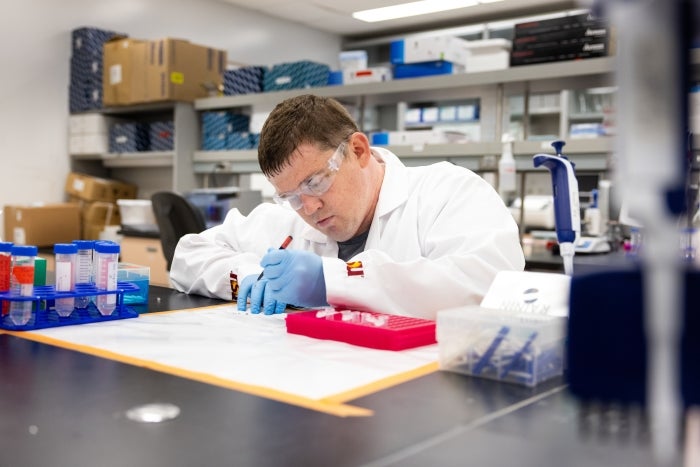ASU researchers target insecticide resistance in mosquitoes

Third-year PhD student Donald Ward points to a netted box filled with mosquitoes at the Huijben Lab in ISTB1. Photo by Samantha Chow/ASU
Mosquitoes are the deadliest creatures on the planet, transmitting life-threatening diseases like malaria, West Nile virus, Dengue and yellow fever.
According to the U.S. Centers for Disease Control and Prevention, these bloodthirsty insects kill more than 700,000 people each year and are becoming increasingly more resistant to insecticides.
In fact, in preliminary studies Arizona State University researchers have found that 85% of a type of mosquito found in Maricopa County are resistant to efforts to suppress them.
“And that’s a huge problem,” said Silvie Huijben, an associate professor at ASU’s Center for Evolution and Medicine.
Researchers in the Huijben Lab are studying the evolutions and mutations of mosquitoes that are making them immune to efforts to eliminate them.
Huijben and her colleagues lead research here, and in the newly renamed Alex Eugene “Gene” Elefant Insectary, where they study different types of mosquitoes and West Nile virus carriersThe West Nile virus is carried by birds, and mosquitoes transmit the virus from the birds to humans or other animals..
Huijben, an award-winning teacher, asks her students to answer three important questions:
- Are these local mosquitoes resistant to insecticides?
- How do they develop resistance?
- And will they be able to easily develop resistance to new chemicals?
“We want to answer these questions prior to a major outbreak of disease,” said Huijben, “because once we have another full-blown pandemic — and hopefully that will never happen again — we want to know what chemicals we should be using to suppress them.”
In recognition of World Mosquito Day on Aug. 20, we look at the work of two of Huijben's students.
While most people prefer to keep a protective distance from mosquitoes, ASU student researcher Don Ward has spent eight years studying them. And while the third-year PhD candidate has not necessarily come to like them, he says he appreciates their importance.
Ward studies insecticide resistance in a variety of mosquito species in Maricopa County and is particularly interested in the impact of fogging by vector control.
Mosquito season in Arizona peaks from March to the first week in June, and again from late August to the end of November. Despite the dry climate in the Valley, mosquitoes can successfully breed in sewers, in areas that use irrigation and on golf courses.
Ward has been performing field trials by setting up cages at various distances behind Maricopa County pickup trucks that are spraying insecticides. He also puts out different materials such as wood, glass and cement to see if there are varying deposition rates for the different materials.
In Ward’s most recent study, he found that the process killed only 15% of mosquitoes known to be highly resistant. Beyond that, its efficacy diminished significantly.
“In my most recent trial ... we found that not many of them died at all,” said Ward. “The fogging efforts coming out of Maricopa County or anywhere in the country are not as effective as people think — especially with resistant populations. If we keep spraying them, they are eventually not going to work. I think that is already happening.”
Mackenna Berg has been working in the Huijben Lab since 2022.
She graduates in December with a bachelor’s degree in molecular biosciences and biotechnology, and will be getting her master’s degree in biology at ASU as well.
Berg has been studying mosquitoes in Arizona that carry the dengue and zika viruses. She secures the insects from the Maricopa County's Vector Control division, and studies them by extracting their DNA determine if there are mutations present and if there are any geographic patterns of these mutations across the county.
For her master’s degree, she will be studying mosquitoes that carry the West Nile virus.
“It's definitely frightening,” Berg said. “We knew insect resistance was a growing problem. We just weren't sure how much of a problem it was.
“This information is a wake-up call. These are frightening creatures that can develop these resistance mutations so quickly and can spread so quickly as well. We have to hurry things up and find a new solution.”
More Science and technology

ASU water polo player defends the goal — and our data
Marie Rudasics is the last line of defense.Six players advance across the pool with a single objective in mind: making sure that yellow hydrogrip ball finds its way into the net. Rudasics, goalkeeper…

Diagnosing data corruption
You are in your doctor’s office for your annual physical and you notice the change. This year, your doctor no longer has your health history in five-inch stack of paperwork fastened together with…
Large-scale study reveals true impact of ASU VR lab on science education
Students at Arizona State University love the Dreamscape Learn virtual reality biology experiences, and the intense engagement it creates is leading to higher grades and more persistence for biology…


